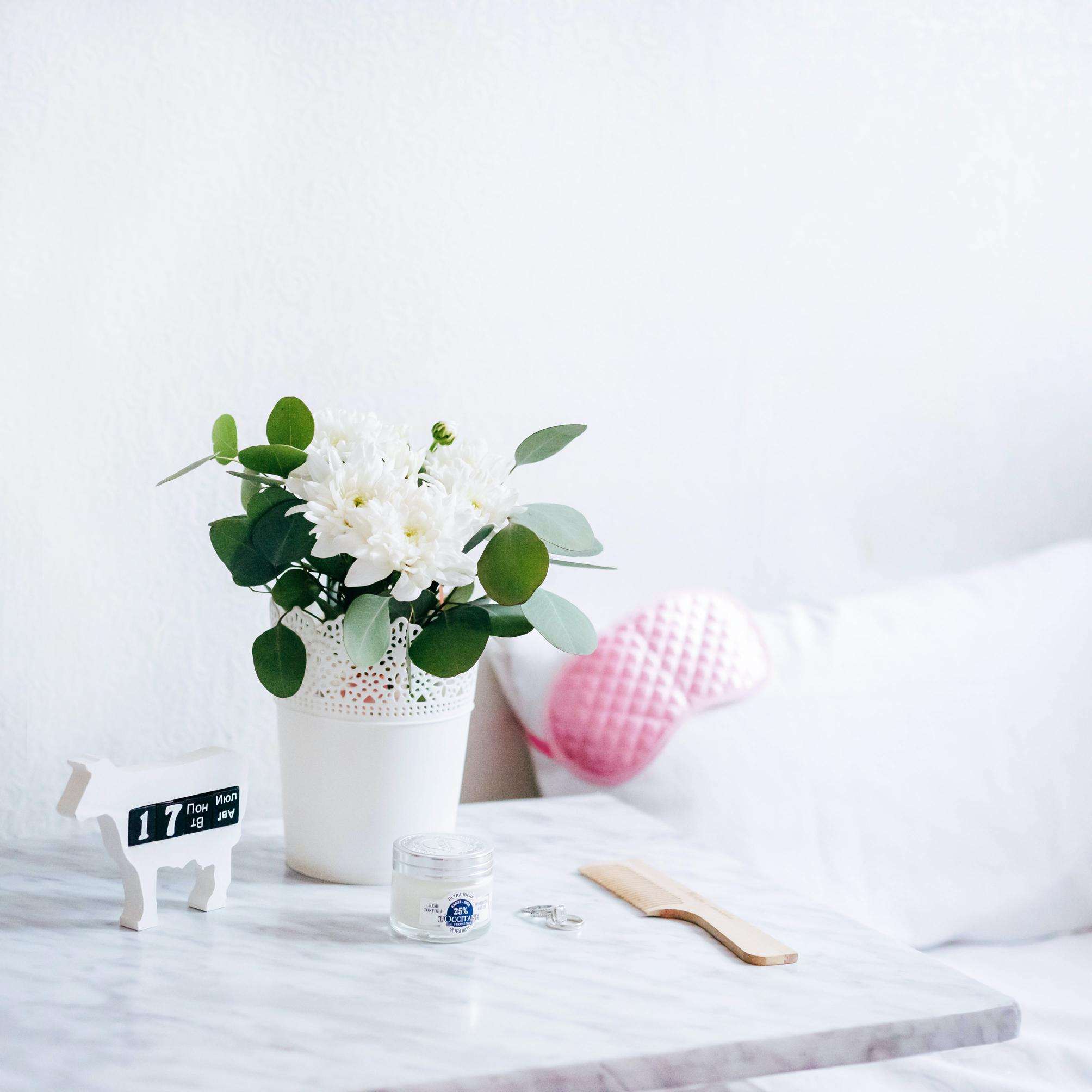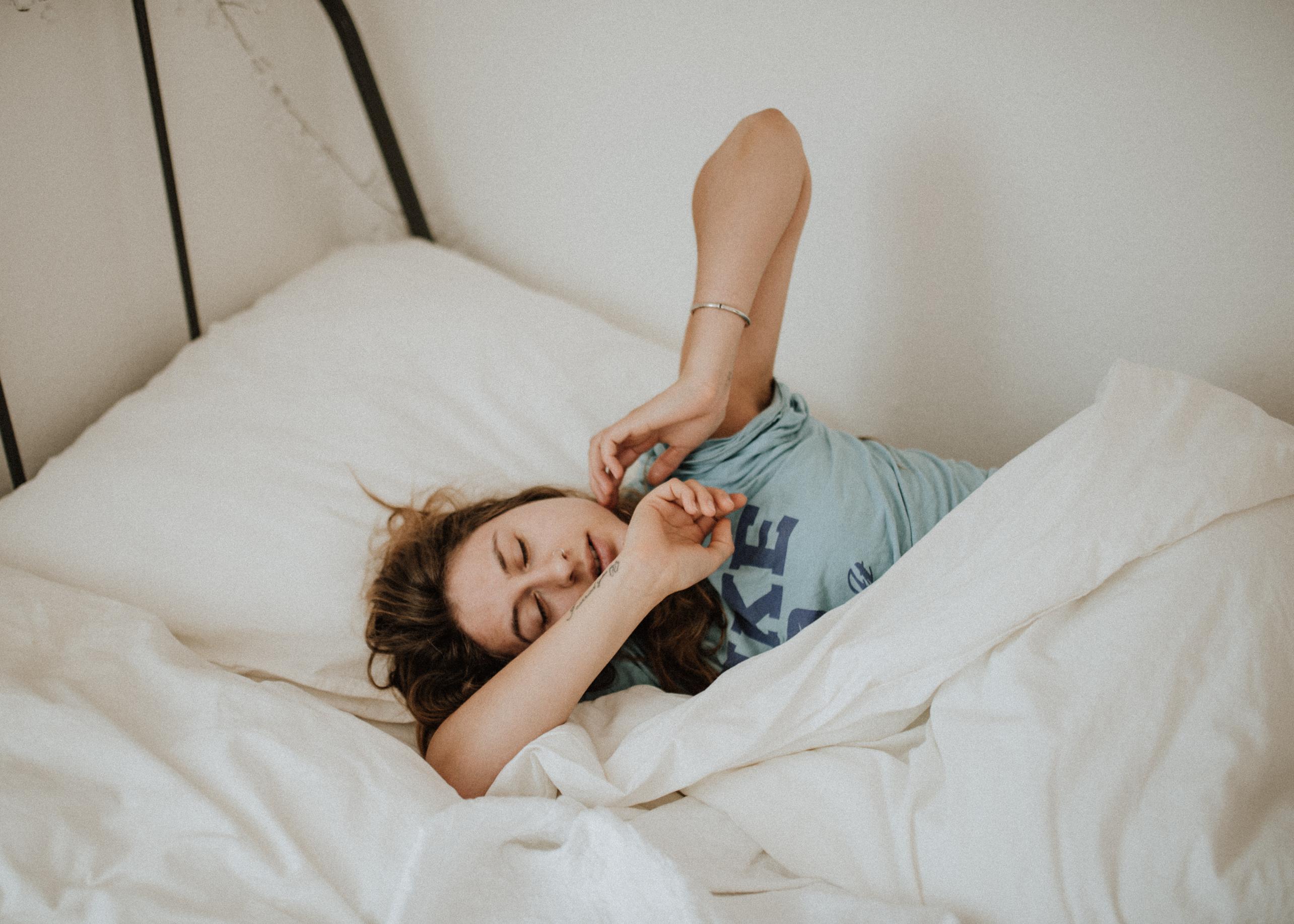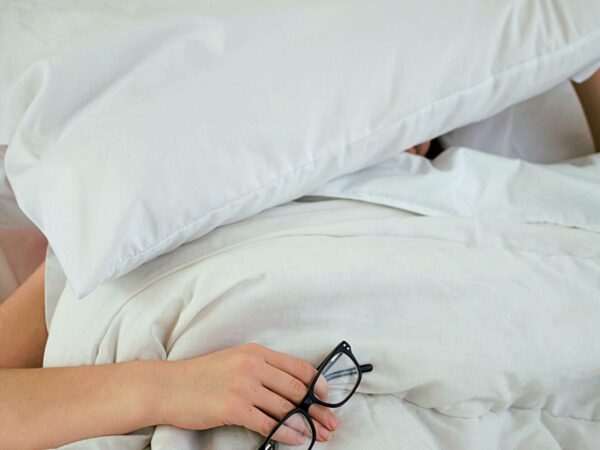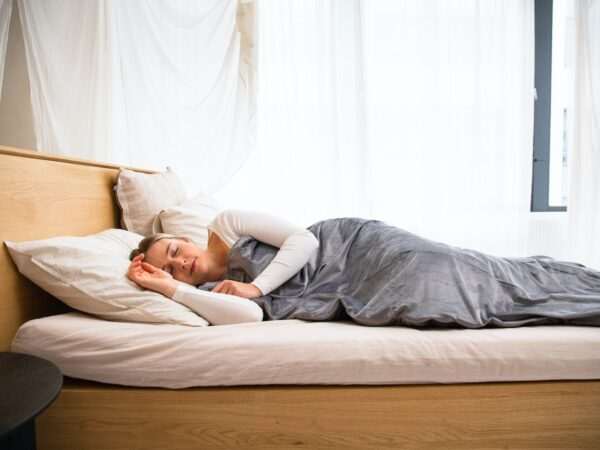Summary. Getting a good night’s rest is essential for our physical and mental health. However, establishing and maintaining a regular sleep schedule can be difficult. This article outlines a range of simple steps to improve sleep: setting a consistent schedule, avoiding screens late at night, and ensuring your bedroom is comfortable. By making small changes to our behavior and environment, we can all create a more restful and balanced sleep routine.
Sleep is something that we all need for our mental and physical health, yet many of us find it hard to improve our sleep quality and routines. Are you looking for ways to feel well-rested and energetic during the day? Do you want to know how you can improve your sleep routine and have a good night’s rest? Here are some tips to get you started. Good sleep routine starts from the moment you wake up. Adjusting your daily habits can make an enormous difference in helping you fall asleep faster and stay asleep throughout the night. Start your day early by waking up around the same time each morning and getting some sunlight.
Another important factor is to limit your exposure to screens during the night. The blue light released by smartphones, computers, and TVs can disrupt your circadian rhythm. If possible, try to avoid using any kind of digital device for at least an hour before going to bed. Instead, indulge in a calming activity like reading or listening to soothing music. The environment in which you sleep is also important. Make sure your sleeping area is free of distractions and comfortable for a good night’s rest.
If possible, block out any artificial light coming from outside your window. Lastly, do not forget to give yourself a break! Establish a healthy routine by allowing yourself some time to wind down but not too close to when you plan to go to sleep. Are you planning to improve your sleep routine? What other tips do you have to ensure a good night’s rest? Share your thoughts in the comments below!
Establish a regular bedtime and wake time schedule. This is the most important thing you can do to improve your sleep routine. Going to bed and getting up at roughly the same time each day will help keep your body’s internal clock on track, helping you fall asleep more quickly and wake up feeling more refreshed. Remove distractions such as TVs, computers and phones from the bedroom. While TVs, computers, and phones offer convenience and entertainment, they also generate light that may keep you awake. Shutting down your electronics about an hour before bed so your brain can relax is a great idea.
Physical activity can help promote better sleep. Aim for at least 30 minutes of exercise each day, but avoid vigorous activities, such as running or weight lifting, right before bed. Avoid caffeine, alcohol, nicotine and large meals 3-4 hours before bedtime. Caffeine, especially, will take several hours to start wearing off and can interfere with your sleep. Likewise, try to avoid large, spicy or heavy meals late in the evening, as these can interfere with digestion and sleep. Spend time outside each day.
A few minutes outside each day can make a huge difference. Avoid napping in the afternoon or evening. Naps are great, but too close to bedtime can make it harder to fall asleep. Try to keep naps under 30 minutes and before 4pm. Spend more time relaxing before bed. Take a warm bath, read a book, meditate or practice some other form of relaxation to help you prepare for sleep.
Assessing Your Current Sleep Habits

. How to Improve Your Sleep RoutineLack of quality sleep can have a major impact on your daily life, sapping away your energy, affecting your productivity and mood, and even making it more difficult to stay healthy and active. Fortunately, there are a few simple steps you can take to improve your sleep routine and get the restful slumber you need. To start, it’s important to assess your current sleep habits and then make changes accordingly. Factors like timing, environment, and activity have all been shown to influence your ability to attain quality sleep. Start by identifying what time of day you usually go to sleep, as this will help you set a consistent sleep schedule.
Make sure your bedroom isn’t too bright or noisy, and invest in quality bedding and pillows that provide the best possible comfort. From there, you can also think about your pre-bedtime activities, such as screen time and caffeine intake. Many people find it beneficial to limit their exposure to blue light in the hours leading up to bedtime. Try to avoid screens like TV and phones in the hours leading up to bed and also be mindful of how much caffeine you consume. Reducing or eliminating caffeine can have an enormous impact on both your quality and quantity of sleep.
Try creating a specific nighttime routine that signals to your body that it is time to rest. This might include reading on the couch, stretching out, or taking a warm shower. The key is to avoid anything that might stimulate your senses too much, like watching intense TV shows, checking your work emails, or eating a heavy snack. By assessing your current sleep habits and making tweaks accordingly, you can make significant improvements in the quality of your sleep. With a solid sleep routine, you will have more energy, improved concentration, and a healthier lifestyle.
Unveiling Your Optimal Sleep Needs

Sleep is an integral part of your health and wellness, and having a good night’s sleep is essential to be able to function at your best the next day. Your body’s needs vary from day to day and week to week, and finding your optimal sleep needs will help you to live your life to the fullest. So, how do you find your optimal sleep needs? To start, let’s take a look at what constitutes a good night’s sleep.
Good sleep includes 7 to 8 hours of uninterrupted sleep every night. If you find that you are consistently waking up in the middle of the night, chances are that you are not getting the restful sleep you need. Additionally, your sleep should be consistent. Try to go to bed around the same time each night and wake up around the same time each morning. This will help to get your body into a regular sleep schedule. Along with the amount of sleep you get each night, the quality of sleep is also important.
This is when your body goes into a state of relaxation and is able to repair itself from the wear and tear of the day. Deep sleep typically occurs after the first hour of sleeping and is often disrupted by being woken up throughout the night. The amount and quality of sleep you get is important to your overall wellness and productivity the next day.
It can be difficult to judge the optimal amount of sleep you need. Everyone is different and may need different amounts of sleep depending on their lifestyle. To figure out your optimal sleep needs, it is important to assess your lifestyle, schedule, and stress levels. Lifestyle: pay attention to the activities you do during the day. How much physical activity do you get? Are you often sitting for long periods of time throughout the day?
Calming Yourself Through a Sleep Routine

Creating a sleep routine is an important step to calming yourself and becoming ready for a deep, restful sleep. An effective sleep routine consists of three components: establishing a bedtime, eliminating distractions, and fostering good sleep hygiene. With a well-thought-out plan, you can help yourself get a better night’s sleep and improve your overall physical and mental health. Establishing a bedtime is important for your sleep routine and is the foundation of it. Pick a time when you tend to feel tired and stick to it. This will let your body know when it’s time to go to sleep and your body will be better prepared for rest at the same time each day.
Eliminating distractions is also key when trying to get a restful night’s sleep. Shut down devices like laptops and phones, lower the lights, and reduce background noise. Bring a book to bed or listen to calming music if it helps you relax. You can also dim the lights and shut off your devices in the hours before bedtime to help your body begin to wind down. Finally, promote good sleep hygiene. Make your bedroom conducive to sleep and invest in supportive bedding and mattress.
Taking a warm bath, using essential oil diffuser, or having a cup of herbal tea before bed may also help. Developing healthy sleep habits can make it easier to fall asleep and stay asleep. By implementing a sleep routine, you can effectively relax your mind and body and make it easier to fall asleep. Establish a bedtime, eliminate distractions, and promote good sleep hygiene. These simple steps can help you get a better night’s rest and improve your overall wellbeing.
Crafting an Ideal Sleep Environment

Creating an ideal sleep environment can have a significant impact on your sleep quality and help you improve your sleep routine. Whether you’re sleeping in a bed, a hammock, or an air mattress, getting the right temperature and level of darkness is essential. Moreover, the decor and items in your sleep environment should be comfortable and encouraging of restful sleep. Beginning with temperature, if your room is too hot or too cold it can interfere with your ability to stay asleep or even fall asleep in the first place.
A good way to ensure a comfortable temperature is to invest in a temperature-regulating air conditioning or heating system. When it comes to darkness, this is also key to getting a good night’s rest. Make sure to shut off any sources of light when you’re ready to go to sleep; this includes any lamps, televisions, or lights from other rooms that may be visible from where you’re sleeping. The darker the better, so it’s even a good idea to invest in blackout curtains or shades.
Remove any clutter from under and around the bed, and use bedding that is comfortable and inviting. From a cozy mattress topper or pillow to a light, calming blanket or sheet, the bed should be a place where you feel relaxed and at ease. You may even want to add a few items such as a diffuser, a small plant, or a white noise machine for additional comfort. By optimizing your sleep environment, you can make sure that you’re getting the best sleep possible. Set the right temperature, eliminate all sources of light, organize your sleeping area, and use calming items in your bedroom – and you’ll be on your way to a better sleep routine.
Eating Healthy Food for Quality Rest

Eating healthy food is an important part of having a good night’s rest. We all know that what we put into our bodies can have an effect on how we feel. But sometimes, the effects of poor eating habits are felt the most when we need to get a good night’s rest. If you’re feeling drained and tired throughout the day, and can’t seem to get a full night’s rest, it may be time for you to consider making a few changes to your diet.
Eating healthy food for quality rest is not only an important part of keeping your body healthy, but it’s also crucial for having a good sleep routine. This article will provide some advice on how to improve your sleep routine by eating healthier foods. First and foremost, you’ll want to make sure that you’re consuming a balanced diet that includes plenty of fruits and vegetables.
It’s also important to avoid consuming large amounts of sugar, caffeine, and other stimulants because these can disrupt your natural sleep cycle. When it comes to timing, you’ll also want to consider the best time to eat each meal. Eating your breakfast in the morning, then lunch in the afternoon, and dinner in the evening can help to keep your body’s metabolism running efficiently throughout the day.
Additionally, try to avoid eating late at night, as this can lead to indigestion and prevent you from falling asleep quickly. Additionally, healthy snacks throughout the day can be very beneficial. Eating food that is high in protein and complex carbohydrates, such as nuts, seeds, and whole grain snacks, can help to keep your energy levels steady.
Maximizing Energy Through Exercise

Inadequate sleep can lead to decreased productivity, impaired memory, weakened immunity, and even mood disturbances. Improving your sleep routine can help give you more energy, allowing you to do more with your day and make sure you get a good night’s rest. The first step towards improving your sleep routine is to create a bedtime routine that can help you wind down and relax before bedtime. Establishing a repetitive pattern of activities and behaviors before a set time should help you relax and prepare for the night.
Another way to improve your sleep routine is to have a consistent bedtime and wake time. Exercising during the day can help your body become more tired, aiding in better and more restful sleep. However, you should avoid exercising too close to your bedtime as this may overtire your body and make it difficult to fall asleep. To ensure a beneficial sleep routine, avoid screens late at night. The blue light that is emitted by devices can disrupt your internal clock and the production of melatonin, a hormone responsible for inducing sleep.
Reducing Stress to Improve Sleep

In fact, many studies show that stress is one of the primary causes of bad sleep habits and disrupted slumber. If you’re suffering from sleep issues thanks to stress, the good news is that there are a number of methods to reduce stress to help improve your sleep. The first step in reducing stress to improve sleep is to create a predetermined sleep routine. This begins with determining a fixed bed time and wake time, and sticking to it regardless of your activity.
Additionally, you can add other steps in your pre-bed routine such as turning off electronics or reducing lights and providing your body signals that it’s time to sleep. The second step to reducing stress to improve sleep is to practice relaxation techniques. Sit in a relaxing, comfortable position and focus on breathing in and out. Alternatively, many people like to practice yoga or Tai Chi to achieve deeper relaxation. You can also use mindfulness meditation as a way to be more in tune with your body, reducing stress and helping you rest.
Caffeine can stay in your body for an estimated 12 hours after drinking, so it’s ideal to limit this in order to reduce the impact on your sleep. Additionally, try avoiding heavy meals late in the evening as well in order to give your body time to digest before bed.
Seeking Treatment for Sleep Disorders

Seeking treatment for a sleep disorder can be a daunting task. How do you know if you even have a sleep disorder? And if you do, what is the best way to improve your sleep routine? A good place to start is understanding the most common sleep disorders, so you can identify the symptoms and develop strategies to overcome them. Insomnia and sleep apnea are two of the most common sleep disorders.
Symptoms of insomnia may include difficulty falling asleep at night, frequent waking during the night, difficulty returning to sleep, a lack of energy during the day, feeling irritable or moody due to lack of sleep, or experiencing physical or mental fatigue. Symptoms of sleep apnea may involve snoring, daytime sleepiness, morning headaches, and a lack of energy during the day. If you think you may have a sleep disorder, it’s important to see a sleep specialist for a diagnosis.
They will review any medical history and symptoms, and possibly recommend a sleep study to determine what’s causing the problem. Treatment for sleep disorders will depend on the underlying cause, but can often include lifestyle modifications and practices such as regular exercise, avoiding day time naps, and establishing a relaxing bedtime routine.
Additionally, promising treatments such as cognitive behavioral therapy (CBT) are proving to be effective in helping people with long-term sleep trouble. In general, improving your sleep routine can be a great start to improving the quality of your sleep. Make sure to establish a set bedtime and waking time, avoid screens and stimulating activities before bedtime, and make your bedroom a comfortable, relaxing environment conducive for sleep.
Bottom Line
The importance of a good night’s sleep cannot be understated, and having a successful sleep routine is critical apportioning to a good night’s sleep. To achieve positive outcomes from sleep, it’s important to be aware of how you feel before and after you rest. If you feel alert and refreshed after you wake up, your sleep routine is in a good place. Conversely, if you feel lethargic and unmotivated after getting up, then it’s time to make some changes to improve your sleep routine. Whenever possible, try to sleep and wake up at the same time every day. Consistency helps keep your body from getting too comfortable in any particular situation. Additionally, it’s wise to prevent too much daylight from streaming into your bedroom at night.
Cutback on caffeine in the evenings. Since caffeine is a stimulant, it can prevent the body from being able to relax. Additionally, alcohol should be avoided in the evenings, as this can lead to disturbed sleep in the night. It’s also best practice to avoid eating late at night, as this can lead to a range of digestive issues. When it comes to finding comfort and relaxation, a comfortable environment is essential. Investing in a good mattress, quality bedding, and pillows all contribute to a restful sleep.
To conclude, having and maintaining a healthy sleep routine can have a positive effect on your overall wellbeing. To improving restful sleep, it’s important to maintain a consistent sleep-wake cycle, and block out any natural daylight in the bedroom. Furthermore, it’s important to avoid caffeine and alcohol in the evening, as well as too much food late at night. Finally, investing in a good mattress, bedding, and pillows can also go a long way towards achieving a restful sleep. Do you have any tips of your own about how to improve your sleep routine? What techniques do you use? Please share your thoughts in the comment section below.
FAQs: The Insider View
What is the golden rule of sleep?
The golden rule of sleep is to get seven to eight hours of sleep each night.
What are 3 rules for better sleep?
Establish a routine – try to go to bed and wake up at the same time each day 2. Reduce your intake of caffeine and alcohol and avoid them in the evenings 3. Create a relaxing bedtime environment – keep the temperature in the room cool, limit blue light exposure from screens and remove any noise or distractions.
What is the rule of 10 3 2 1 0 sleep?
The 10-3-2-1-0 method involves doing 10 minutes of light physical activity, three deep abdominal breathing exercises, two minutes of progressive muscle relaxation, one minute of focusing on positive thoughts, and finally spending zero minutes on screens or other electronic devices before going to bed.
What is a good sleep routine?
- Establish a regular bedtime and wake-up time each day and stick to it.
- Avoid screen time close to bedtime and instead try some relaxing activities such as reading a book or taking a bath.
- Avoid caffeine, alcohol, and sugary snacks before bed.
- Exercise regularly during the day, and do so at least 3 hours before bed.
- Spritz your pillow with essential oils or use a soothing scent to help you relax.
- Adjust the temperature in your bedroom to make sure you don’t get too hot or too cold.
- Reduce external noise so that it doesn’t disturb your sleep.
- Take a few minutes to relax before bed and clear your mind of any worries or anxious thoughts.
- Shut off all electronics and remove them from your bedroom to avoid distractions.
What is the 3 2 1 method for sleeping?
It involves counting backwards from three, followed by two, then one. Each number is counted while taking slow, deep breaths and focusing on relaxing your body. As you move from three to two to one, the breathing should become more relaxed and deeper. Once you reach “one,” drift off to sleep.
Used Reference Links:
https://www.healthline.com/nutrition/17-tips-to-sleep-better















